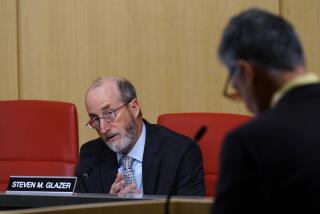California to reap windfall from Mark Zuckerberg in Facebook IPO
SAN FRANCISCO — California has a friend who’s about to write a hefty personal check that could help ease the state budget crunch.
Mark Zuckerberg, the 27-year-old founder and chief executive of Facebook Inc., may have to pay the state $189 million in taxes after the Menlo Park, Calif., social networking company’s initial public offering of stock in two weeks, according to calculations from PrivCo, which researches private companies. The IPO could value Facebook at $96 billion.
The federal government will be in the money too, collecting an estimated $714 million in federal income taxes from Zuckerberg.
PrivCo calculated the windfalls using the high end of Facebook’s pricing range for its IPO of $35 a share. At that price, Zuckerberg stands to make more than $1 billion from selling about 30 million of the 534 million shares he owns.
PrivCo expects Facebook to price its IPO as high as $40 a share, which would add tens of millions more to California and the federal government’s coffers.
“The funds are badly needed as California continues to suffer from budget deficits and could not have come at a better time for the state,” said Sam Hamadeh, PrivCo’s founder and CEO.
And that’s just the payout from Zuckerberg. The windfall for California from all of the insiders cashing in on the IPO could net the state hundreds of millions more, Hamadeh said.
“More taxes will come due as more shares are sold beginning in December and well into 2013 after the traditional 180-day post-IPO ‘lock-up’ period expires,” he said. That’s when employees can sell even more shares, resulting in new capital gains taxes to California — and the IRS — with each new stock sale.
Facebook executives tailed by camera crews met with the company’s underwriters in New York on Friday to prepare for its investor road show, which begins Monday.
Facebook, which plans to list its stock on the Nasdaq Stock Market under the symbol FB, will hold a series of meetings around the country with institutional investors such as mutual funds, hedge funds and pension funds.
On Thursday the company posted a glossy video on the Web outlining its presentations to investors. If all goes as planned during the road show, bankers and executives will sit down May 17 to price the stock, which begins trading the next day.
Facebook got a “buy” recommendation Friday from Wedbush Securities Inc. and a target price of $44. Michael Pachter, an analyst at Wedbush in Los Angeles, gave Facebook its first rating since it announced plans Thursday to sell shares in a range of $28 to $35.
“At these prices, demand for Facebook shares will likely outstrip supply, and we expect the shares to trade up,” Pachter said in a note to investors. “We think that given the huge upside potential for revenue and earnings growth, a $44 target price is warranted.”
Pachter said he expected the growth in the already huge number of Facebook users would drive higher advertising revenue, and that mobile advertising would play an important role in capturing more ad dollars. He’s also bullish on the revenue Facebook gets from taking a cut of digital goods sold on its site through Zynga and other companies. Facebook keeps as much as 30% of the transactions.
California is hoping that Facebook will have a “Google effect” on the state’s economy. Capital gains tax receipts from stock sales rose to $54 billion in 2005 from $39.7 billion in 2004, the year Google Inc. went public, according to Franchise Tax Board figures.
When Facebook executives and employees cash in shares, the state takes a 10% cut of the profits.
In February, Legislative Analyst Mac Taylor became the first state official to estimate what Facebook’s big Wall Street debut could mean for California’s ailing budget. He said the IPO could pump nearly $2.5 billion into state coffers over the next five years.
More to Read
Inside the business of entertainment
The Wide Shot brings you news, analysis and insights on everything from streaming wars to production — and what it all means for the future.
You may occasionally receive promotional content from the Los Angeles Times.









